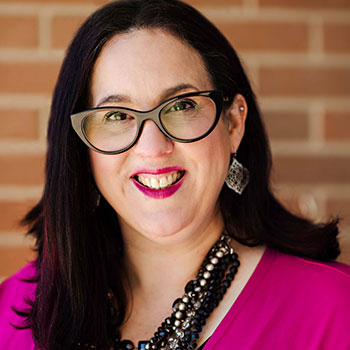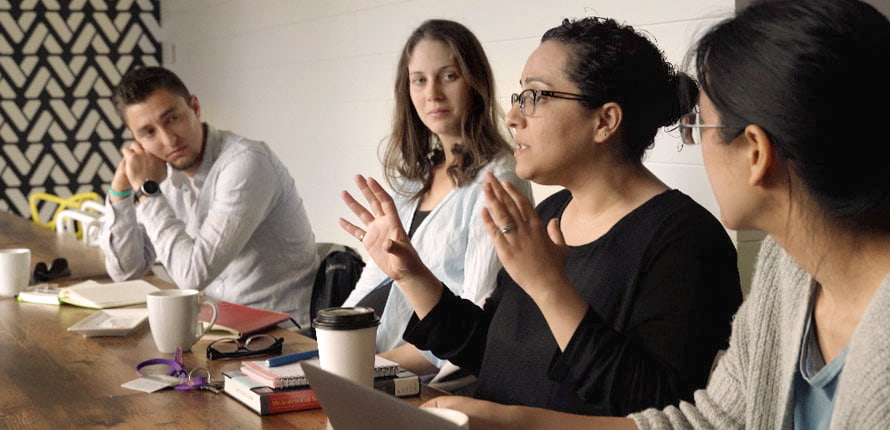Search for academic programs, residence, tours and events and more.
Our Master of Science (MSc) in Psychology program is offered within the cognitive and behavioural neurosciences field. You’ll have the opportunity to start conducting research with a faculty adviser in your first year. You’ll learn how to develop a program of research, use research methodologies and statistical techniques, and communicate your research as an expert in the field.

Team-focused research.
Unique facilities and research methods.
Hands-on research opportunities.
Neuroscience is one of the most exciting and rapidly advancing fields in all of the life sciences. At Laurier, we take a broadly integrative perspective, examining the interaction between behaviour, cognition and the nervous system across a diverse set of species from fish to humans, ranging in scale from populations, to individuals, to cells, on timescales ranging from milliseconds to generations.
The objectives of the MSc program are to develop competence in designing, conducting and evaluating research in the neurosciences. The purpose of the program is to prepare you for doctoral studies, or for employment in an environment requiring research skills.
You’ll hit the ground running and start conducting research with a faculty advisor in the fall of your first year. Over the course of 16 to 24 months, with the close mentorship of your advisor, you’ll learn how to develop a program of research, use research methodologies and statistical techniques, present your work in talks and posters, and communicate your research as an expert in the field.
You'll form close bonds with faculty and peers through small, intensive courses, research lab groups, and regular area meetings including seminars and journal clubs.
This full-time program is normally completed in two years (six consecutive terms). Four half-credit courses and a thesis constitute the degree requirements. Considerable emphasis is placed on developing and completing the thesis.
Required courses:
Our faculty work in the fields of behavioural and cognitive neuroscience. Specific research foci include:
Our research interests are interconnected, focusing on the mechanisms underlying:
Our facilities allow faculty members and students to employ a rich diversity of tools and techniques including:
In addition, a field station is equipped to study large groups of freely behaving animals to study the neural mechanisms organizing complex social behaviour.

"Immerse yourself in all Laurier has to offer while completing your graduate education. Enjoy the journey – remember to have fun too!"
Paula C. Fletcher, associate dean, Faculty of Graduate and Postdoctoral Studies
Take the first step in your graduate education and apply to one of our graduate programs. Follow our three-step admission process — we’ll walk you through how to apply and prepare for your first day as a graduate student.
After you have submitted your OUAC application, paid the non-refundable application fee, and Laurier has received your application, you'll receive an email from gradadmissions@wlu.ca advising you to upload the additional required documentation to Laurier’s Online Registration and Information System (LORIS).
Please note, the application process and the uploading of supplemental documentation, which includes references, typically takes two weeks. To avoid disappointment, apply early.
An application for admission to our MSc program in Psychology must include:
Visit our Graduate Admissions Toolkit for more information about applying.
Proficiency in written and spoken English is essential to graduate studies at Laurier. Applicants whose language of instruction during their previous postsecondary education was not in English must submit evidence of proficiency in English. If applicable, results from accepted testing services must be uploaded to LORIS.
Questions? Contact Jeffery Jones, graduate coordinator, at jjones@wlu.ca or 548.889.3746. For general inquiries, contact Rita Sharkey at rsharkey@wlu.ca or 548.889.3863.
Regardless of the type of graduate degree program you intend to pursue, financial planning is important. At Laurier, we want to provide you with as much information as possible about a variety of scholarship and funding opportunities and equip you with the skills to manage your finances effectively in the years to come.

Our graduates have gone on to work in medical research, policy and planning for various agencies, and both staff and faculty academic positions.
Examples of jobs held by our graduate include:
ASPIRE is Laurier's professional skills development training program for graduate students. The program helps you craft an individualized, extracurricular learning plan tailored to your professional journey and entry to the workplace.
Learn about the interests and ongoing research of our faculty members. If their research interests you, email the professor directly to set up a meeting. Include information about yourself, your skills, your experience, and why you’re interested in their research.
Nathan Insel
Assistant Professor
Paul Mallet
Chair, Associate Professor
Diano Marrone
Professor
Noam Miller
Associate Professor
David White
Associate Professor
Todd Ferretti
Associate Professor
Jeffery A. Jones
Director, Laurier Centre for Cognitive Neuroscience
Professor
Graduate Officer
Elizabeth Olds
Associate Professor
Philip Servos
Professor
Nikki Sheerer
Assistant Professor
Ann Marie Beals
Assistant Professor
Alexis Buettgen
Assistant Professor
Todd Coleman
Assistant Professor of Health Sciences
Maritt Kirst
Associate Professor
Co-Director, Laurier Centre for Community Research, Learning and Action
Natalie Kivell
Assistant Professor
Melody Morton Ninomiya
Assistant Professor of Health Sciences
Manuel Riemer
Professor
Director, Viessmann Centre for Engagement and Research in Sustainability
Ketan Shankardass
Associate Professor of Health Sciences
Ciann Wilson
Associate Professor
Co-Director, Laurier Centre for Community Research, Learning and Action
Meaghan Barlow
Assistant Professor
Sybil Geldart
Associate Professor
Brantford Campus
Alexandra Gottardo
Professor
Marc Jambon
Assistant Professor
Tobias Krettenauer
Professor
Danielle Law
Associate Professor
Brantford Campus
Joanne Lee
Associate Professor
Kim P. Roberts
Professor
John W. Schwieter
Professor
Eileen Wood
Professor
Roger Buehler
Professor
Justin Cavallo
Associate Professor
Judy Eaton
Associate Professor
Brantford Campus
Mark Eys
Professor Kinesiology and Physical Education
Canada Research Chair
Mindi Foster
Associate Professor
Christian Jordan
Professor
Associate Chair
Frank Kachanoff
Assistant Professor
Nancy Kocovski
Professor
Evgenia (Jane) Milman
Assistant Professor
Erin Strahan
Associate Professor
Brantford Campus
Anne Wilson
Professor
Canada Research Chair
Jeffery A. Jones
Professor
Graduate Officer
Nancy Kocovski
Professor
Associate Chair
Paul Mallet
Professor
Chair, Psychology
Think this is the perfect program to continue your education?